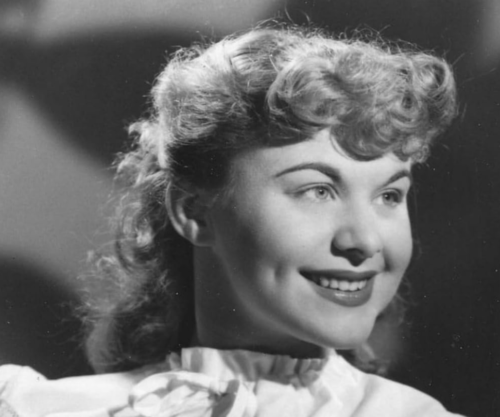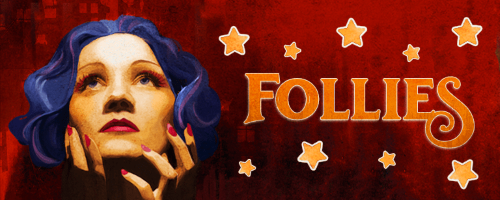A FULFILLING FOLLIES
One night? I mean, ONE night? Then again, the reunion in Follies we witness takes place on one night as well. And for those at said reunion and those of us lucky enough to be at Musical Theatre Guild‘s staged concert performance of Follies last Sunday, it was a night to remember. Taking on this highly complex 1971 masterpiece as a one-night presentation with with just 25 hours of rehearsal time is a gargantuan task. Director Jason Graae is wholly up to it, with his extraordinarily well-cast thespians knocking numbers out of the park one after another, aided by Brad Ellis‘s accomplished musical direction with a tiny band (quite apropos for a stage party), and production manager Kelley Dorney holding it all together. Often accompanied by Lee Martino‘s simple but effective choreography, the show benefits from a move, leaving the Alex Theatre in Glendale to MTG’s new home at the 499-seat BroadStage in Santa Monica. The sold-out crowd was simply buzzing, something the sound never did for the first time in many a CTG production. Here’s hoping they get settled in soon, so that the current two-show season (The Wedding Singer on March 10, 2024, is next) will blossom once more into a five-show season of rarely produced musicals.
In the annals of American musical theater, Follies stands as a triumph of introspection and melancholy. This evocative and haunting production weaves a tapestry of nostalgia, regret, and faded glamour against the backdrop of a country grappling with a sense of disillusionment and change. It’s a timeless exploration of aging, the illusory nature of show business, and the general malaise that characterized the United States in the 1970s.
Roger Befeler as Buddy
With actors on-book, James Goldman’s ever-so-sleight and choppy book (“virtually plotless” according to Sondheim) made more sense to me than ever, even though Sondheim is the reason why this show is ever revived at all. The creators take us to an old, dilapidated, soon-to-be demolished theatre (for a parking lot!) that was once home to the Weismann’s Follies, a fictional musical revue of the 1920s and ’30s. Weismann himself (Glenn Rosenblum) throws this reunion party and a middle-age to geriatric ward of antiquated thespians show up (alongside their ghostly younger selves) to belt out a song and belt down a drink. Once the aging characters confront their pasts, regrets, and unfulfilled dreams, a theme that is as relevant today as it was in the 1970s, the show becomes “Loveland,” during which each main character exorcises their regrets in a mini-version of a full-fledged Follies show.
Anastasia Barzee as Sally & Teri Bibb as Phyllis
Stephen Sondheim’s score is the most brilliant example of musical theatre pastiche ever written (or, as Sondheim calls them, “fond imitations”). He skillfully weaves a tapestry of various styles by composing songs that paid tribute to different Golden-Age Broadway composers and their signature styles. It’s pioneering, ingenious, and strikingly dramatic with some of the most stunning lyrics ever written, not to mention internal rhymes like “Beauty Celestial, the Best You’ll Agree” from “Beautiful Girls.” Sung by powerful tenor Paul Wong, this song captures the essence of Jerome Kern’s romantic and lush compositions, and is one that would have been sung in Weissman’s Ziegfeld-like shows.
Jennifer Leigh Warren
Another is “Broadway Baby,” which pays homage to the compositions of Jule Styne, who was known for his catchy, upbeat show tunes (and with whom Sondheim wrote Gypsy). The song’s brassy and optimistic tone is delivered by the sassy 95-year-old (!) Helen Geller, who has been singing with MTG for years and still sounds amazing playing Hattie. Of all the performers on stage, she really could have been in Weismann’s shows. A Cole Porter-esque “Ah, Paris!” (Susan Edwards Martin as Solange) and cutesy novelty song “Rain on the Roof!” (Eydie Alyson and Brad Ellis as the Whitmans) will end up colliding with “Broadway Baby” for a roaring finale. (Talk about a “great, big Broadway show.”)

Helen Geller, then, and now as Hattie.
Then there was the haunting duet between the erstwhile operetta star Heidi Schiller and the ghost of her younger self singing “One More Kiss” (a nearly perfect example of a “pastiche” song that evokes the same depth of feeling as any of the Strauss melodies that inspired it) which was exquisitely moving as performed by the elegant Mary VanArsdel as Heidi and Bryce Charles as Young Heidi. The endearing, watchable Ms. Charles positively enraptured me. “Who’s That Woman,” in which Stella (Barbara Carlton Heart) and other elder hoofers (and their chorine doppelgangers) tap their way to a tumultuous ovation, is another winner. As Carlotta, Jennifer Leigh Warren sounded spectacular as she camped her way through “I’m Still Here.”
Mary VanArsdel as Heidi & Bryce Charles as Young Heidi
The central characters, Sally and Phyllis, are emblematic of the ways in which people grapple with the passage of time. Sally, portrayed as a lovelorn and dreamy woman, clings to the memory of a romance with Ben, who is currently Sally’s husband, a successful millionaire who struggles with a sense of existential emptiness. Sally embodies the regrets and what-ifs that haunt many as they age, serving as a stark reminder of the opportunities lost to time. Her husband Buddy is a womanizer who is still in love with his wife but knows that he will never live up to Ben’s mythical status. Phyllis, on the other hand, represents the façade of youthful beauty and ambition that often masks deeper insecurities and disillusionment.
Teri Bibb as Phyllis
The great Teri Bibb chews up Phyllis’s dialogue and spits it out with glee, and her retort to Ben, “Could I Leave You?”, had just the right blend of power, anger, and irony. Between her idiosyncratic voice and superlative movement, the Kurt Weill-ish “The Story of Lucy and Jessie” (backed by dancers Ricky Bulda and Michael James Brown, whose gyrating hips should be donated to the Smithsonian) was hot, hot, hot! Brent Schindele plays Ben with the aloofness one would expect from a jaded politician, hinting at Ben’s demons of regret and disenchantment, and his distinguishing, succulent tenor vocals are as gorgeous as ever. Ben’s “The Road You Didn’t Take” possesses the requisite emotional range, and his “Live, Laugh, Love” contains the desperation that finally brings the personal follies of the quartet to a close.
Roger Befeler as Buddy & Brent Schindele as Ben
Anastasia Barzee suits the unfulfilled housewife Sally perfectly; this Sally isn’t slipping down the drain, as with so many in the role before her, and keeping her threadbare sanity in check during her “Losing My Mind” number made it a highlight. Completing the dysfunctional quartet is Roger Befeler as Buddy: affable and oozing with talent, the hard-working actor managed to hold his own in “Buddy’s Blues,” a high-paced Vaudeville number that would leave a marathon runner winded (once again Bryce Charles was magic, this time playing the Follies version of Buddy’s girlfriend, Margie). It helped that Buddy’s dance was cut here, but so were a pair of tango dancers and some dialogue from other productions (as with Chess, I’m sure Follies will forever be tinkered with to have the book elevated to the score’s ingenuity). I’m not saying MTG cut anything, it may just be the version offered by the folks to whom they’re paying royalties.
Anastasia Barzee as Sally
Throughout Follies, Sondheim and Goldman brilliantly contrast the illusions of the past with the stark realities of the present. The lead quartet’s younger selves are played by Ashley Fox Linton (Sally), Gabriel Navarro (Buddy), Chelsea Morgan Stock (Phyllis), and Will Collyer (Ben), showcasing with appeal the idealized versions of the two couples from their show days during the Loveland sequence. Young Ben and Young Phyllis sing a duet about their happiness (“You’re Gonna Love Tomorrow”), while Sally and Buddy’s younger selves imagine overcoming each other’s irritating traits (“Love Will See Us Through”).
What make’s this Follies rapturous is that the actors simply have an air of theatrical distinction about them. Graae’s commendable production had astounding moments of glory.
photos by Stan Chandler

